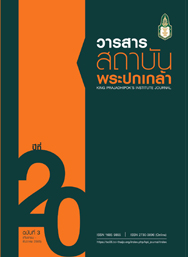Decision-Making Model and Response to Crisis of Local Administrative Organizations in Upper Northern Thailand. Case of the Coronavirus 2019 (COVID-19) Pandemic.
Main Article Content
Abstract
The objectives of study aims 1) to study the process, operational decision-making model, and response to crisis of local administrative organizations in case of the Coronavirus 2019 (COVID-19) pandemic 2) to study the factors and conditions which support to the operational decision-making processes and crisis response and 3) to propose a policy recommendation on operation procedure and decision-making process of local administrative organizations in case of crisis situation. The research uses mixed methods both of quantitative and qualitative research. The 103 samples are local administrative organizations in Upper Northern of Thailand. The research tools are questionnaires and in depth-interviews. The data analysis uses descriptive statistics, multiple regression analysis, and content analysis. Research results are as the followings:
Normally, the local administrative organization works closely to local people. The response to crisis condition of COVID-19 pandemic of the local administrative organization had never happened. Once this happens, it impacts on people lives which cause to the quality defect and investigation on process. According to the study, it is evidence that most of the decision-making (70.9%) from local administrative organizations are done by chief of local government organization (mayor/executive chief officer). This is an appropriate way to take an action on crisis in terms of rapidness. However, there are some errors. On the other side, decision-making process which made by a group such as a committee, and local council made more prudent action but time’s consuming point. However, all forms of decision-making results have a similar process which begins with finding information in order to make a decision-making.
This research shows that there is a significant factors between the capabilities of the leaders, potential to predict the risk of disease, and open information receptivity of the leader which are all relevant on the decision-making process. These factors can be explained in variance of the decision-making process on COVID-19 pandemic for 59.1% (R2=0.591, F= 23.139, P<0.01). Moreover, there are statistical relationships to respond COVID-19 pandemic crisis of the local administrative organization such as the ability to make a decision of the leaders, a perception of the disease’s stages, a number of populations, an open information receptivity of the leaders, and connecting through external network. These factors are shown on variance of the response to crisis for 44.8% (R2= 0.448, F= 12.970, P<0.01).
The research proposes three significant policy recommendation. Firstly, small and middle-level local government organizations should have sections and tasks relating to public health prevention, and also promote the crisis situation at the community level. Secondly, there should have an operational system/ mechanism, particularly on regulations and practice guidelines to deal with crisis. Lastly, there must have knowledge of the development crisis’s management, emphasizing on personal quality development based on data and well-prepared performance.
Article Details

This work is licensed under a Creative Commons Attribution-NonCommercial-NoDerivatives 4.0 International License.
@ 2020 King Prajadhipok's Institute The Government Complex Commemorating All Right Reserved.
References
ภาษาไทย
กรมส่งเสริมการปกครองท้องถิ่น. (2563). สรุปข้อมูล อปท. ทั่วประเทศ. สืบค้นจาก http://www.dla.go.th/work/abt/
กระทรวงสาธารณสุข. (2562). แนวทางการปฏิบัติงานด้านสาธารณสุขในระดับพื้นที่ระหว่างองค์กรปกครองส่วนท้องถิ่น (อบต. เทศบาล) และกระทรวงสาธารณสุข (รพ.สต.). นนทบุรี: กองยุทธศาสตร์และแผนงาน สำนักงานปลัดกระทรวงสาธารณสุข กระทรวงสาธารณสุข.
กระทรวงมหาดไทย. (2563, 3 พฤศจิกายน). ประกาศคณะกรรมการกลางพนักงานเทศบาล เรื่อง มาตรฐานทั่วไปเกี่ยวกับโครงสร้างการแบ่งส่วนราชการ วิธีการบริหารและปฏิบัติงานของพนักงานเทศบาล และกิจการอันเกี่ยวกับการบริหารงานบุคคลในเทศบาล (ฉบับที่ 4) พ.ศ. 2563.
กุลธิดา นาคพิน. (2550). การเมืองเรื่องการจัดการสภาวะฉุกเฉินขององค์กรปกครองส่วนท้องถิ่นจังหวัดเชียงใหม่: กรณีศึกษาสถานการณ์อุทกภัยในปี พ.ศ. 2548. (รัฐศาสตรมหาบัณฑิต) มหาวิทยาลัยเชียงใหม่, สาขาการเมืองการปกครอง. เชียงใหม่.
โกวิทย์ พวงงาม. (2554). การปกครองท้องถิ่นไทย หลักการและมิติใหม่ในอนาคต. กรุงเทพฯ: วิญญูชน.
จิรุตม์ ศรีรัตนบัลล์ และคณะ. (2564). โครงการวิจัยการตอบสนองและเตรียมการของระบบบริการสุขภาพไทยต่อวิกฤตการระบาดของ COVID-19: การดำเนินการของโรงพยาบาล และผลกระทบทางเศรษฐกิจและสังคมภายในขอบเขตของระบบสุขภาพ. กรุงเทพฯ: สถาบันวิจัยระบบสาธารณสุข.
ชนงกรณ์ กุณฑลบุตร. (2547). หลักการจัดการ: องค์การและการจัดการแนวคิดการบริหารธุรกิจใน สถานการณ์ปัจจุบัน. กรุงเทพฯ : จุฬาลงกรณ์มหาวิทยาลัย.
ธร สุนทรายุทธ. (2551). การบริหารจัดการเชิงปฏิรูป : ทฤษฎี วิจัย และปฏิบัติทางการศึกษา. กรุงเทพฯ: บริษัท เนติกุลการพิมพ์ จำกัด.
นครินทร์ เมฆไตรรัตน์ และคณะ. (2552). รายงานผลการศึกษาความก้าวหน้าของการกระจายอำนาจในประเทศไทย. กรุงเทพฯ: สถาบันวิจัยและให้คำปรึกษาแห่งมหาวิทยาลัยธรรมศาสตร์.
บรรยงค์ โตจินดา. (2548). องค์การและการจัดการ. กรุงเทพฯ: รวมสาส์น.
ประกาศกระทรวงสาธารณสุข เรื่อง ชื่อและอาการสำคัญของโรคติดต่ออันตราย (ฉบับที่ 3) พ.ศ. 2563. (2563, 29 กุมภาพันธ์). ราชกิจจานุเบกษา. เล่ม 137 ตอน 48ง. น. 1.
ปัณณทัต นอขุนทด. (2556). ปัจจัยที่มีผลต่อการบริหารจัดการองค์กรปกครองส่วนท้องถิ่น กรณีศึกษาองค์กรปกครองส่วนท้องถิ่นในอำเภอขามสะแกแสง จังหวัดนครราชสีมา. (วิศวกรรมศาสตรมหาบัณฑิต) มหาวิทยาลัยเทคโนโลยีสุรนารี, สาขาวิชาวิศวกรรมโยธา. นครราชสีมา.
พวงรัตน์ ทวีรัตน์. (2540). วิธีการวิจัยทางพฤติกรรมศาสตร์และสังคมศาสตร์. กรุงเทพฯ: สำนักทดสอบทางการศึกษาและจิตวิทยา มหาวิทยาลัยศรีนครินทร์วิโรฒ ประสานมิตร.
ศิริพร พงศ์ศรีโรจน์. (2540). องค์การและการจัดการ. กรุงเทพฯ: มหาวิทยาลัยธุรกิจบัณฑิตย์.
สีตีปาตีฮะร์ อีลา, อิควาณี วานิ, อาฟีดะห์ ดอเลาะ, วัชระ ขาวสังข์, และปิยะดา มณีนิล. (2564). การแก้ปัญหาการรับมือและการป้องกันการแพร่ระบาดโรคติดเชื้อไวรัสโคโรนา 2019 องค์การบริหารส่วนตำบลม่วงเตี้ย อำเภอแม่ลาน จังหวัดปัตตานี. ใน การประชุมหาดใหญ่วิชาการระดับชาติและนานาชาติครั้งที่ 12, (น. 466-478). สงขลา: มหาวิทยาลัยหาดใหญ่.
สำนักงานเลขาธิการสภาผู้แทนราษฎร. (2563). สรุปมาตรการและการดำเนินงานของไทยต่อสถานการณ์การแพร่ระบาดของโรคติดเชื้อไวรัสโคโรนา 2019. กรุงเทพฯ: สหภาพสมาชิกรัฐสภาเอเชียและแปซิฟิก สำนักงานสหภาพรัฐสภา สำนักงานเลขาธิการสภาผู้แทนราษฎร.
สุชาติ ประสิทธิ์รัฐสินธุ์. (2536). การวิเคราะห์การถดถอย: แนวคิด วิธีการ และการประยุกต์ใช้. กรุงเทพฯ: เลี่ยงเชียง.
สุภาภรณ์ วงธิ. (2564). ปัจจัยที่ส่งผลต่อพฤติกรรมการป้องกันโรคติดเชื้อไวรัสโคโรนา 2019 ของอาสาสมัครสาธารณสุขประจำหมู่บ้าน จังหวัดสุโขทัย. (สาธารณสุขศาสตรมหาบัณฑิต) มหาวิทยาลัยนเรศวร, บัณฑิตวิทยาลัย. พิษณุโลก.
สุรพงษ์ คงสัตย์ และธีรชาติ ธรรมวงค์. (2551). การหาค่าความเที่ยงตรงของแบบสอบถาม (IOC). สืบค้นจากhttps://www.mcu.ac.th/article/detail/14329
สุวิมล ติรกานันท์. (2548). ระเบียบวิธีการวิจัยทางสังคมศาสตร์: แนวทางสู่การปฏิบัติ. กรุงเทพฯ: โรงพิมพ์แห่งจุฬาลงกรณ์มหาวิทยาลัย.
เสรี วงษ์มณฑา. (2552). การประชาสัมพันธ์ : ทฤษฎีและปฏิบัติ. กรุงเทพฯ: ธีระฟิล์ม.
อภิสิทธิ์ ฉัตรทนานนท์. (2552). กลยุทธ์การบริหารภาวะวิกฤตสำหรับผู้นำองค์กร. วารสารบริหารธุรกิจ, 32 (122), 8-18.
อังศุมาลิน อังศุสิงห์. (2558). การบริหารแบบเครือข่ายในการจัดการภาวะฉุกเฉินอุทกพิบัติภัย. (ปรัชญาดษุฎีบัณฑิต) สถาบันบัณฑิตพัฒนบริหารศาสตร์, สาขาพัฒนาสังคมและการจัดการสิ่งแวดล้อม. กรุงเทพมหานคร.
ภาษาอังกฤษ
Becker, M.H. & Maiman, L.A. (1975). The Health Belief Model and Sick Role Behavior, in the Health Belief Model and Personal Health Behavior. New Jersey: Charles B. Slack.
Cohen, J. (1988). Statistical Power Analysis for The Behavioral Sciences. Hillsdale, NJ: Lawrence Erlbaum Associates, Publishers.
Devlin, E. S. (2006). Crisis Management Planning and Execution. Boca Raton, FL: Tylor & Francis Group.
Faul, F., Erdfelder, E., Lang, A. & Buchner, A. (2007). G*Power 3: A Flexible Statistical Power Analysis Program for the Social, Behavioral, and Biomedical Sciences. Behavior Research Methods, 39 (2), 175-191.
Hair, J. F. Jr. Black, W. C., Babin, B. J. Anderson, R. E. & Tatham, R. L. (2006). Multivariate Data Analysis. (6th Edition). New Jersey: Prentice Hall.
Likert, R. (1932). A Technique for the Measurement of Attitudes. Archives of Psychology, 140, 1–55.
Niininen, O. (2013). Five Star Crisis Management: Examples of Best Practice from the Hotel Industry. Retrieved from http://dx.doi.org/10.5772/55209
World Health Organization Thailand. (2020). Novel coronavirus (COVID-19). Retrieved from https://www.who.int/thailand/emergencies/novel-coronavirus-2019
Yukl, G. A. (1989). Leadership in organizations. Englewood Cliffs, New Jersey: Prentice-Hall.


